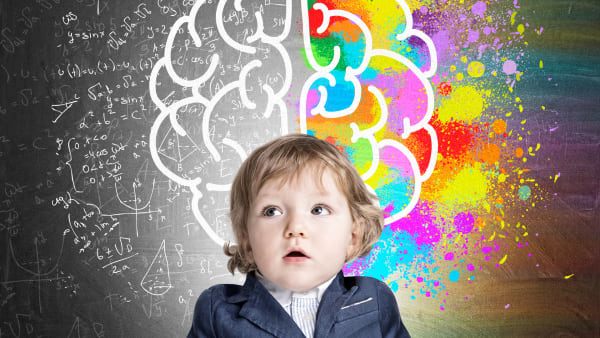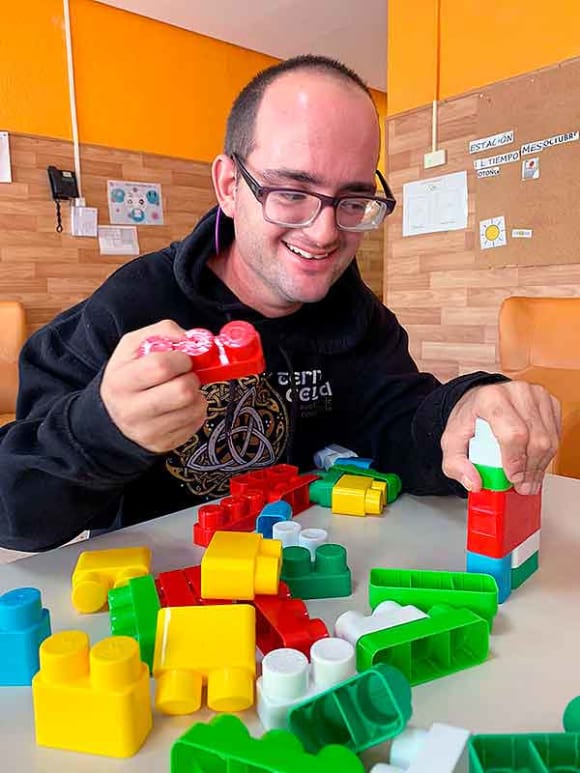
Limits of human intelligence: Giftedness and under-giftedness
- 1.- Albert Einstein's brain
- 2.- Giftedness
- 3.- Findings on the brains of people with above-average intellectual abilities
- 4.- About the brain - FYI
- 5.- Brainless
- 6.- How do I know if my child is smart or gifted?
Throughout all of humanity, people with highly privileged brains that overflowed the limits of the average IQ (Intellectual Quotient) have excelled.
Were these people really so above average? Were his abilities exceptional?

Albert Einstein's brain
Albert Einstein was one of the most brilliant minds throughout the history of mankind. His way of seeing the world and his interpretation of the laws that govern our universe completely changed the paradigm in force at that time.
Was this because his brain had something different that no one else had?
The American pathologist Thomas Stoltz Harvey in charge of performing the autopsy on Albert Einstein preserved the German's brain for decades in order to carry out detailed studies, which were finally published many years later.

Thomas concluded the following:
In Albert Einstein's brain there was a higher proportion of glia cells, indicating more optimal neuronal communication.
There are many who believe that genius can be identified in the brain in a simple way. However, there are detractors who think that this is much more complex and that those who studied Einstein's brain saw what they wanted to see.
The only thing that is clear is that there are humans who have and have shown exceptional intellectual abilities, what we know as giftedness.
Giftedness
In a very colloquial way, we can understand a gifted person as someone really brilliant who stands out in highly variable areas.
Another school of thought defines giftedness based on IQ. Only those who have an IQ greater than 130 are considered gifted.
This second way of understanding giftedness receives a lot of criticism. Well, intelligence is calculated through a quantification system that only measures a series of skills such as verbal comprehension, perceptual reasoning, working memory and processing speed, without taking into account social or cultural factors that can influence the results.
Intelligence consists not only of knowledge, but also of the ability to apply knowledge in practice. Aristotle, Greek philosopher.
Although, for example, there are countries like Spain, where 3 conditions are required to be considered gifted, and if one of these is not present, one cannot speak of giftedness:
- IQ above 130
- High academic performance
- Great creativity
There are experts who maintain that to be considered a gifted person, components such as creativity, motivation, etc. must also be evaluated.
Every human being can be, if they so choose, a sculptor of their own brain. Santiago Ramón y Cajal
In general, giftedness is usually detected during childhood and despite the fact that this is an advantage for the infant, it can generate social and educational problems

First of all, the conventional educational systems are not designed for these types of people. There are experts who maintain that advancing courses is not the solution, since it can generate a very serious problem by finding yourself in a very different social environment from the one that corresponds to your age.
This issue has been studied from the different educational structures around the world and there is still no suitable answer.
We are all gifted at something! It's about finding out what. That should be the main function of education. Today instead, she is focused on cloning students. And you should do the opposite: find out what is unique about each of them. Sir ken Robinson
Focusing on the anatomy of the brain, it has long been thought that gifted children have a greater number of connections between neurons, with very strong activity patterns.
Different studies have shown that there are differences between the brain of a person with an average IQ and a gifted one, although they are not always met, which shows that there is no pattern.
In short, we can say that to date a classic brain profile of a gifted person has not been defined.
Findings on the brains of people with above-average intellectual abilities
- In some cases a more developed corpus callosum appears. This is the region of the brain that communicates the two hemispheres, which may mean a much more efficient transfer of information.
- There are also studies that show greater activity in the parietal region, or in the splenius.
- In other cases it has been possible to demonstrate a better organization in the hippocampus.
What is not known is whether these changes have allowed the person to be gifted or vice versa giftedness has led to greater development of these areas of the brain.

About the brain - FYI
The human brain weighs approximately 1.5 kg, which represents a very small percentage of our body weight. It still uses 20% of the energy we consume.
Inside we find between 86 thousand and 100 billion neurons, which can have about 10 thousand connections each. Which makes it the most complex organ in our body. However, over the years, despite its complexity, we know more and more about it and how it works.
In fact, we are currently experiencing a revolution in the field of neuroscience. Well, answers are beginning to be found to many questions raised decades ago about the human brain.
The 1990s became known as “The Decade of the Brain” due to great scientific advances, such as the appearance of imaging techniques such as magnetic resonance imaging. However, despite all the advances to date, many fundamental aspects are still unknown.
Let's imagine that the brain is like the screen of our mobile phone and that right now we can only see a tiny dot on that screen, a single pixel. Thanks to the advancement of scientific research we are beginning to see hundreds of pixels on that screen and very soon we will be able to see a full picture of our brain. Rafel Yuste, Researcher at Columbia University

For all this, although the decade of the brain was in the 90s, it is right now in the 2020s, when a true revolution of neuroscience is taking place.
- In recent years, all world powers have invested billions of dollars in researching the human brain.
- All these initiatives have something in common, and that is that they are not focused on researching diseases that affect the nervous system, but rather on developing technology that allows the brain to be studied in all its complexity and with precision.
- And thanks to all these advances we will be able to obtain that complete image that will help us understand and therefore be able to cure the different pathologies that affect the brain.
Brainless
If we remember the curve that defines the level of intelligence of the population, it shows that the majority has an average IQ and only a small percentage is at the extreme that corresponds to the gifted, which are less than 2% or 1%, this varies from according to the source.
At the other end of this curve we find people whose IQ is well below average, meaning that they have some degree of mindless or intellectual disability.

To better understand how this happens, we need to understand a bit about how the prenatal neurodevelopment process works.
Prenatal neurodevelopment
These are actions that are extremely controlled by a series of components that are responsible for the correct development of the brain.
It is a critical period that can be affected by environmental or biological factors.
- Between the biological factors we can highlight those with a genetic basis, which have diseases as a consequence: such as down syndrome, which generate an alteration in the structure of the brain.
- Between the environmental factors we can highlight for example: when the woman does not know that she is pregnant and subjects the embryo to a series of toxic substances without any type of regulation such as nicotine, drugs, alcohol, drugs, etc. There are also cases that are difficult to control, such as viral infections.
What IQ does a child with Down syndrome have? IQ in children with Down syndrome varies, but the mean is around 50, compared to normal children, whose mean IQ is 100.
Under-endowment can also be generated during adolescence as a consequence of substance abuse such as alcohol or drugs, as in adulthood, toxic components that can end up causing irreparable damage. This is known as Limit Intelligence.
People with Borderline Intelligence or Borderline Intellectual Functioning are characterized by having an IQ between 70 and 85, the average being between 85 and 115, just below what the World Health Organization (WHO) considers to be normal.
There are also people with mild intellectual disability, are those whose IQ is between 55 and 70. The general characteristics are the same for those with Limit Intelligence with the difference in the degree of intensity of the support they require to obtain autonomy in the activities of daily life.
Both people with mild intellectual disability and borderline intelligence usually have deficits in some of the following areas:
- communication
- personal care
- domestic life
- social skills
- interpersonal
- use of community resources
- self control
- academic skills
- worked
- leisure
- health
- security
How do I know if my child is smart or gifted?
It is customary to confuse these terms. Being intelligent is different from being a gifted child, the difference lies in the degree of intellectual capacity that he possesses.
An smart child is characterized by:
- Great curiosity to know how the world works
- They ask a lot of why and how questions.
A gifted child goes beyond what is mentioned above:
- great learning ability
- They continually question
- make logical deductions
Here is a guide to find out if your child has the qualities to be considered gifted:
| Baby | From 1 to 3 years | From 3 to 6 years | From 6 to 9 years | From 9 to 12 years |
|---|---|---|---|---|
|
|
|
|
|
The next thing you can do is to apply an online IQ test, preferably image-based. This way you can get an estimate of their IQ and confirm their giftedness.
Also remember to stimulate him in his family and school environment, so that he does not lose his curiosity and thus does not stop learning. This will help your child to manifest and develop his high capacities 🧠
ONLINE INTELLECTUAL COEFFICIENT TEST

What is your IQ?












